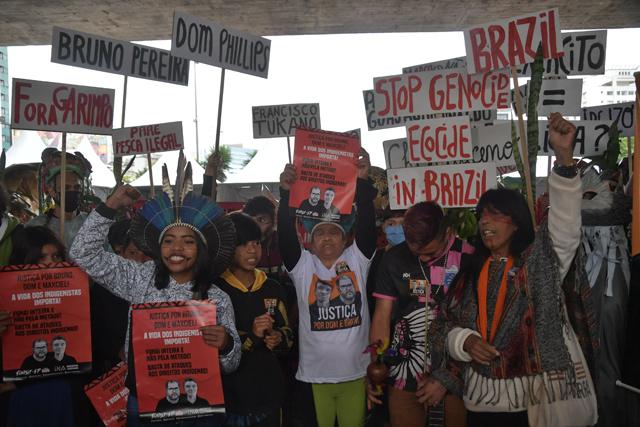You are here
Police take suspect to search site in Amazon missing case
By AFP - Jun 15,2022 - Last updated at Jun 15,2022
ATALAIA DO NORTE, Brazil — Police investigating the disappearance of a British journalist and Brazilian Indigenous expert in the Amazon brought the latest suspect arrested in the case to the search site on Wednesday, media reports said.
The suspect, identified as 41-year-old Oseney da Costa Oliveira, was escorted by officers with his face covered, a red-and-black hooded sweatshirt pulled low over his head, and placed on a police boat, in images shown on TV Globo, Brazil's biggest broadcaster.
Reports said the blue-and-white boat then set off for the spot on the Itaquai River where investigators are searching for signs of veteran correspondent Dom Phillips, 57, and respected Indigenous specialist Bruno Pereira, 41, who disappeared on June 5.
Federal police declined to comment.
Oliveira, nicknamed "Dos Santos", was arrested on Tuesday in Atalaia do Norte, the small northern city that Phillips and Pereira were returning to when they disappeared in the remote Javari Valley after receiving threats during a reporting trip.
A man reported to be Oliveira's brother, Amarildo da Costa de Oliveira, a fisherman nicknamed "Pelado", was arrested on June 7. Investigators are analysing a blood sample found in his boat, as well as suspected human remains found in the Itaquai River.
Witnesses said Amarildo da Costa had been seen following the missing men's boat at high speed shortly before they disappeared.
Phillips, 57, a long-time contributor to Britain's Guardian and other leading international newspapers, was working on a book on sustainable development in the Amazon.
Pereira, highly regarded advocate for the region's Indigenous peoples, was acting as his guide.
The Brazilian was on leave from his job as an Indigenous protection specialist at Brazil's federal agency for native peoples, FUNAI.
He had received death threats for his work helping Indigenous communities resist increasing incursions on their land in the Javari Valley, which sits near the borders with Colombia and Peru and has seen a surge of drug trafficking and environmental crimes such as illegal fishing.
Related Articles
ATALAIA DO NORTE, Brazil — Brazilian police on Friday officially identified the remains of British journalist Dom Phillips, who was found bu
BRASÍLIA — The families of a British journalist and Brazilian indigenous expert who went missing deep in the Amazon after receiving threats
RIO DE JANEIRO — Greece’s ambassador to Brazil was murdered in a plot hatched by his Brazilian wife and her police officer lover, who confes














